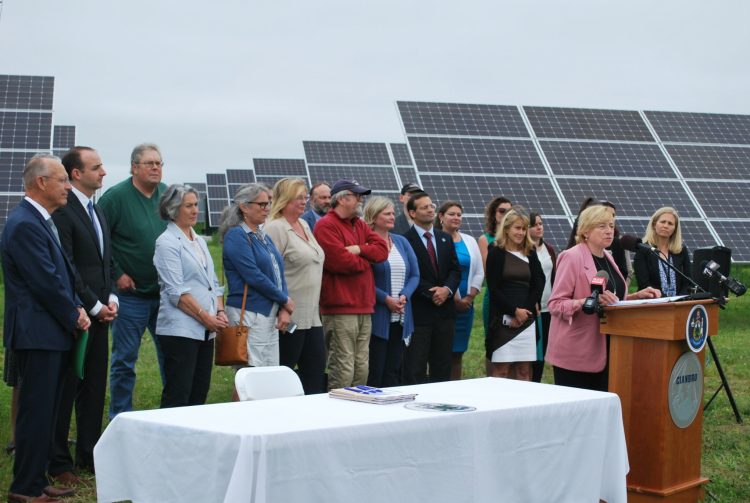PITTSFIELD — Gov. Janet Mills signed three bills aimed at ushering in renewable energy on Wednesday, moving Maine another step forward in taking on climate change.
The Democrat signed the bills in Pittsfield in front of the state’s largest solar array.
The new laws, effective in September, would boost solar incentives and reduce Maine greenhouse gas emissions by 45 percent by 2030 and 80 percent by 2050. Lawmakers also passed legislation to increase Maine’s renewable portfolio standard from 40 percent now to 80 perent by 2030 and 100 percent by 2050.
The newly Democratic-led Legislature swiftly passed such bills – including proposals that had failed in past legislative sessions – this year with support from some Republicans in hopes of reducing emissions and creating clean energy jobs. Republican Sen. David Woodsome said his long-in-the-works solar bill finally “found a champion” in Mills.
Solar businesses and environmental groups have hailed such lawmakers and the Mills administration for its swift embrace of promoting so-called clean energy. Supporters say the new administration’s shift is a sharp contrast to Maine’s former Republican governor, who had long fought long-term solar contracts as giveaways to the solar industry.
The legislation signed by Mills would require the Public Utilities Commission to procure long-term contracts for new clean energy generation, which could be paired with advanced energy storage.
“Maine is once again proving itself a leader on climate action and showing that climate change is a bipartisan concern that requires urgent action,” Natural Resources Council of Maine CEO Lisa Pohlmann said. Her group says that investing in clean energy will reduce energy costs, lead to cleaner air and create new jobs.
Mills also signed her bill to launch a Maine Climate Council, whose membership will include representatives of energy and environmental groups, tasked with creating a new Climate Action Plan to detail how Maine will take on climate change. The new Office for Policy Innovation & the Future will come up with ways for state government to boost clean energy.
As Maine joins a growing number of newly Democratic states passing stricter renewable energy standards, Sen. Angus King of Maine, an independent, is backing a bill in Congress to set a national renewable energy standard. That bill would require electricity providers across the nation to generate at least 50 percent of electricity from renewable sources by 2035.
Send questions/comments to the editors.


